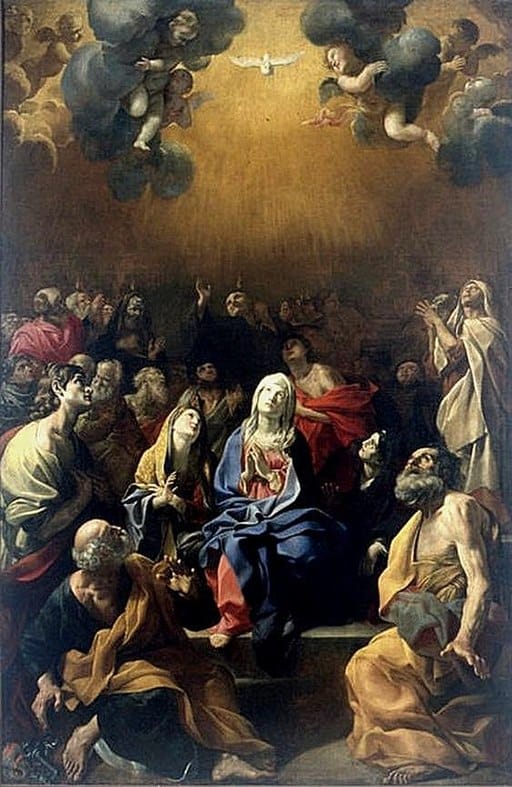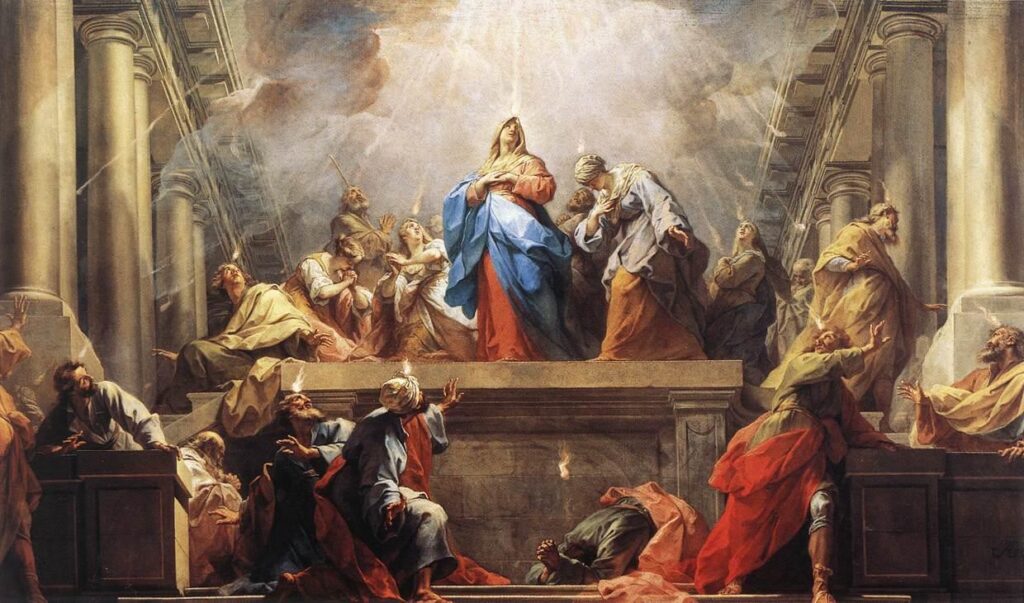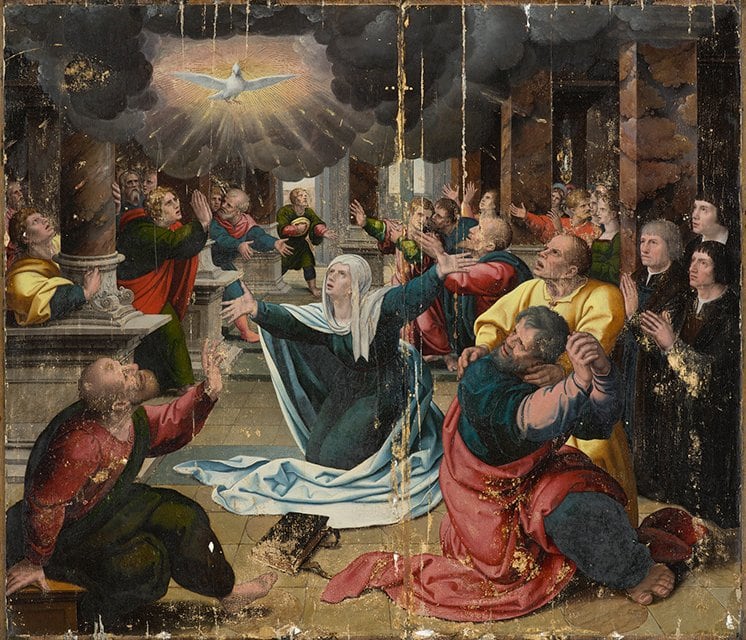The Pentecost Holy Spirit Events in Acts 2
Third Glorious Mystery

Scriptures
Acts 2:1-21
And when the days of the Pentecost were accomplished, they were all together in one place: and suddenly there came a sound from heaven, as of a mighty wind coming, and it filled the whole house where they were sitting. And there appeared to them parted tongues as it were of fire, and it sat upon every one of them: And they were all filled with the Holy Ghost, and they began to speak with divers tongues, according as the Holy Ghost gave them to speak.
Now there were dwelling at Jerusalem, Jews, devout men, out of every nation under heaven. And when this was noised abroad, the multitude came together, and were confounded in mind, because that every man heard them speak in his own tongue. And they were all amazed, and wondered, saying: Behold, are not all these, that speak, Galileans? And how have we heard, every man our own tongue wherein we were born? Parthians, and Medes, and Elamites, and inhabitants of Mesopotamia, Judea, and Cappadocia, Pontus and Asia, Phrygia, and Pamphylia, Egypt, and the parts of Libya about Cyrene, and strangers of Rome, Jews also, and proselytes, Cretes, and Arabians: we have heard them speak in our own tongues the wonderful works of God. And they were all astonished, and wondered, saying one to another: What meaneth this?
But others mocking, said: These men are full of new wine. But Peter standing up with the eleven, lifted up his voice, and spoke to them: Ye men of Judea, and all you that dwell in Jerusalem, be this known to you, and with your ears receive my words. For these are not drunk, as you suppose, seeing it is but the third hour of the day: But this is that which was spoken of by the prophet Joel: and it shall come to pass, in the last days, (saith the Lord,) I will pour out of my Spirit upon all flesh: and your sons and your daughters shall prophesy, and your young men shall see visions, and your old men shall dream dreams. And upon my servants indeed, and upon my handmaids will I pour out in those days of my spirit, and they shall prophesy. And I will shew wonders in the heaven above, and signs on the earth beneath: blood and fire, and vapour of smoke. The sun shall be turned into darkness, and the moon into blood, before the great and manifest day of the Lord come. And it shall come to pass, that whosoever shall call upon the name of the Lord, shall be saved.
Scripture Commentary
What Happened at the Pentecost Holy Spirit Event?
The Pentecost Holy Spirit event marks a defining moment in Christian history. It was the day the Church was born and the Holy Ghost was poured out on the disciples, as recorded in Acts 2. Jesus had instructed His followers to remain in Jerusalem, promising they would soon be baptized with the Holy Spirit (Acts 1:4–5).
Pentecost, which means “fiftieth day” in Greek, was a Jewish feast held fifty days after Passover. It originally celebrated the wheat harvest and later commemorated the giving of the Law to Moses. In Acts 2, God chose this feast to inaugurate a new covenant—one that would bring a spiritual harvest through the outpouring of the Spirit.
Suddenly, a sound like a mighty wind filled the house, and tongues as of fire appeared, resting on each person (Acts 2:2–4). The disciples began to speak in other languages, empowered to proclaim the Gospel beyond barriers of nation and tongue. This moment, often referred to as “spirit baptism,” transformed hesitant followers into bold witnesses.
Peter addressed the astonished crowd, explaining that what they saw was the fulfillment of Joel’s prophecy (Acts 2:17; Joel 2:28–32). He declared that Jesus, whom they had crucified, had risen and was now exalted at God’s right hand (Acts 2:24, 27).
Convicted by the message, about 3,000 people were baptized and added to the Church that day (Acts 2:41). This was more than a dramatic event; it was the beginning of the Church’s public mission—a mission that continues to this day through the same Holy Spirit.

Mary and the Disciples Were United as One Before Pentecost
Before Pentecost, the Apostles and disciples obeyed Jesus’ command to remain in Jerusalem and wait for the promise of the Father (Acts 1:8). In the upper room, they gathered with Mary, the mother of Jesus, praying in unity and anticipation (Acts 1:14).
Mary’s presence is deeply meaningful. She had already received the Holy Spirit at the Annunciation. Now, she waits again—not alone, but with the Church. Her quiet faith and steadfast prayer model how to prepare for the Spirit’s work.
This gathering was the seed of the Church. United in purpose, these men and women show that the Holy Spirit comes not to isolated individuals, but to a people praying and waiting as one. They trusted Jesus’ promise. They believed, together.
Pentecost did not begin with preaching or miracles, but with shared prayer, silence, and obedience. This unity allowed the Spirit to descend in fullness. It reminds us that God builds His Church on hearts aligned in faith and love.
Even now, the Church is called to reflect this same unity—praying together, trusting together, and welcoming the Spirit together. Mary, our Mother in faith, still intercedes for the Church and leads us by example.
What Pentecost Meant in the Bible and Why It Mattered
The word “Pentecost” comes from the Greek term for “fiftieth,” referring to the fiftieth day after Passover. In Jewish tradition, it was known as the Feast of Weeks (Leviticus 23:15–16). Originally a celebration of the wheat harvest, it later also commemorated the giving of the Law to Moses on Mount Sinai.
God chose this day to begin a new harvest—not of grain, but of souls. Acts 2 describes how, on Pentecost, the Holy Spirit was poured out upon the followers of Christ, transforming them into witnesses. This new outpouring did not write the Law on stone but inscribed it on the hearts of believers (2 Corinthians 3:3).
Pentecost, then, becomes a bridge between the Old Covenant and the New. The Church’s mission begins, not with a human strategy, but with divine power. It is also why Pentecost Sunday holds deep meaning in the Church calendar. In some traditions, it is still called Whitsunday.
This event reminds us that God’s work is never random. He acts with purpose, fulfilling both the promises of Scripture and the rhythm of the liturgical calendar. For believers today, Pentecost serves as a powerful call to live in the Spirit and walk boldly in the mission of the Gospel.

The Holy Spirit Came with Wind and Fire
Acts 2 records that while the disciples were gathered in one place, the Holy Spirit descended with unmistakable signs—wind and fire (Acts 2:2–4). These were not mere symbols but divine manifestations. Wind often represents invisible movement and divine breath. Fire purifies, illuminates, and spreads. Together, they marked the presence of God.
This was no emotional moment; it was a supernatural reality. The Spirit came with power, filling each person. The Apostles and others began to speak in various languages, not from training but by the Spirit’s enabling. This miracle served a purpose: to reach people from every nation gathered in Jerusalem.
Jesus had promised this very empowerment (Acts 1:8). What occurred fulfilled His words exactly. Those who had once hidden in fear were now proclaiming the truth with clarity and courage.
The Church was born in power, not in silence. Wind and fire signaled a new creation. This was a holy beginning for a people who would now carry the Gospel across cultural and linguistic lines. That same Spirit still acts in the Church today, although the signs may be quieter, the power remains.
The People Were Amazed by What They Saw and Heard
The outpouring of the Spirit did not go unnoticed. Devout Jews from every nation were in Jerusalem for the feast (Acts 2:5). When they heard the disciples speaking in their own native tongues, confusion gave way to amazement (Acts 2:6–8).
They asked, “How is it that we hear each in our own language?” Some were amazed; others mocked, suggesting the disciples were drunk (Acts 2:13). But it was clear to many that something divine was taking place.
God was making a statement. The Gospel was not for one group or culture. By enabling the disciples to speak in diverse languages, the Holy Spirit showed that salvation was for the entire world. This fulfilled Jesus’ mission to preach to all nations.
The response of the crowd becomes part of the Pentecost story. It prepared the way for Peter’s sermon and the first conversions. Today, this moment reminds the Church to meet people where they are, to speak in a way they understand, and to proclaim the Gospel to all.

Peter Preached with Boldness Through the Holy Spirit
When the crowd gathered in confusion, Peter, filled with the Holy Spirit, stood up and spoke (Acts 2:14). This was the same Peter who had once denied Jesus. Now, he addressed thousands with confidence and clarity.
He began by dismissing the mockery—this was not drunkenness, he said, but the fulfillment of prophecy. Peter quoted Joel, showing that God had promised to pour out His Spirit in the last days (Acts 2:17; Joel 2:28).
He then proclaimed Jesus as the one who had worked signs and wonders among them, who had been crucified, but whom God had raised (Acts 2:22–24). He cited the Psalms to prove that David spoke of the Messiah’s resurrection (Acts 2:27; Psalm 15:10).
Peter’s words were not clever arguments. They were truth, spoken with the authority and fire of the Holy Spirit. He concluded by declaring that Jesus is both Lord and Christ (Acts 2:36). This was the first proclamation of the Gospel after the Resurrection, and it changed everything.
The People Responded with Repentance and Faith
The people who heard Peter were deeply moved. Scripture says they were “cut to the heart” (Acts 2:37). They believed Peter’s message and wanted to respond. Their question was simple and honest: “What must we do?”
Peter gave a direct answer: repent, be baptized in the name of Jesus Christ for the forgiveness of sins, and receive the gift of the Holy Spirit (Acts 2:38). This was the entry point into the new life offered by Christ.
About 3,000 people responded that day and were baptized (Acts 2:41). This marked the first major conversion event in Christian history. The feast of Pentecost, once focused on grain, had become a feast of souls.
This moment reveals how the Holy Spirit works—not just through signs, but through the preached word. The Gospel calls for a response. The Spirit convicts the heart. And when people say yes, the Church grows.
The Spirit-Filled Church Begins Its New Life
After baptism, the new believers didn’t scatter. They formed a community. Acts 2:42–47 shows us the earliest model of Christian life. They devoted themselves to the Apostles’ teaching, the breaking of bread, prayer, and shared life.
They were united and generous. They sold possessions and cared for anyone in need (Acts 2:44–45). They met both in the temple and in homes. Their worship was joyful, sincere, and simple (Acts 2:46).
The Church grew—not by force, but by witness. The Spirit was building a body, not an institution. It was alive, joyful, and welcoming. Each believer played a part. God added to their number daily (Acts 2:47).
This section of the story reminds us that Pentecost was not just about fire and wind. It was about love in action, truth lived out, and daily faithfulness. That is what the Spirit creates when we allow Him to lead the Church.

Why Pentecost Still Matters for the Church Today
Pentecost is not just a historical event. It remains essential to how the Church lives and serves today. What began in the upper room continues in every parish, every believer, and every sacramental life.
Jesus had promised power from the Holy Spirit so that His followers could be His witnesses (Acts 1:8). That power did not end with the Apostles. It continues in the mission of the Church.
The gifts of the Spirit—wisdom, knowledge, counsel, courage, and others—are available to all who are baptized and open to grace (1 Corinthians 12:4–7). These gifts help us build up the Church and live out our faith boldly.
The mission to preach to all nations is still in effect (Mark 16:15). Pentecost reminds us that we are not working alone. The Holy Spirit empowers us, guides us, and sustains the Church through every trial.
Celebrated each year, Pentecost Sunday—also called Whitsunday in some places—reminds us that we are a Spirit-filled people. The same Spirit who came with fire still comes to purify, strengthen, and send.
Living the Pentecost Holy Spirit in Our Daily Life
Pentecost is not a single moment to remember—it is a pattern to live. The Holy Spirit, poured out on the Church, dwells in each believer and continues to act daily. We receive Him in Baptism and Confirmation, and He continues to sanctify through prayer, Scripture, and the sacraments (1 Corinthians 3:16).
To live in the Spirit means to seek His voice, follow His lead, and remain faithful even when it’s hard (Galatians 5:25). The Spirit gives us fruit—charity, peace, patience, and more—not just for personal growth but for the good of others (Galatians 5:22–23).
He also helps us in our weakness, even when we don’t know how to pray (Romans 8:26). His presence is not loud, but deep. He transforms us over time.
Every day is an opportunity to say, “Come, Holy Spirit.” This is not a prayer for the past but a plea for today. The Spirit who came at Pentecost still leads the Church and each member in the mission of Christ.
Feast Day of Pentecost
Pentecost is celebrated in the Christian liturgical calendar 50 days after Easter Sunday. The word “Pentecost” comes from the Greek word “pentēkostē,” meaning “fiftieth.” The feast commemorates the descent of the Holy Spirit upon the apostles and other followers of Jesus, as narrated in the Book of Acts (Acts 2:1-41).
Pentecost is often considered the “birthday” of the Christian Church because it marks the empowering of the disciples with the Holy Spirit, allowing them to go forth and spread the message of Jesus. The feast is characterized by various symbols, including the flames of fire and the speaking in different languages (tongues). Pentecost is a joyous celebration in many Christian traditions, signifying the transformative and unifying work of the Holy Spirit.
Download our Glorious Mysteries pdf Document
We have a Glorious Mysteries pdf available for your use. It is free to download and share. It can be printed and used for praying the Rosary and is an excellent aid for anyone, especially for beginners. The author still uses it to this day.
To view our Glorious Mysteries pdf page, click the link. To go straight to the pdf, click the button below.

Charles Rogers is a resident of South Carolina and a retired computer programmer by trade. Raised in various Christian denominations, he always believed in Jesus Christ. In 2012, he began experiencing authentic spiritual encounters with the Blessed Virgin Mary, which led him on a seven-year journey at her hand, that included alcohol addiction, a widow maker heart attack and death and conversion to the Catholic Faith. He is the exclusive author and owner of Two Percent Survival, a website dedicated to and created in honor of the Holy Mother. Feel free to email Charles at twopercentsurvival@gmail.com.

We strive to provide the most complete and highest quality material we can for you, our readers. Although not perfect,
it is our desire and prayer that you benefit from our efforts.

